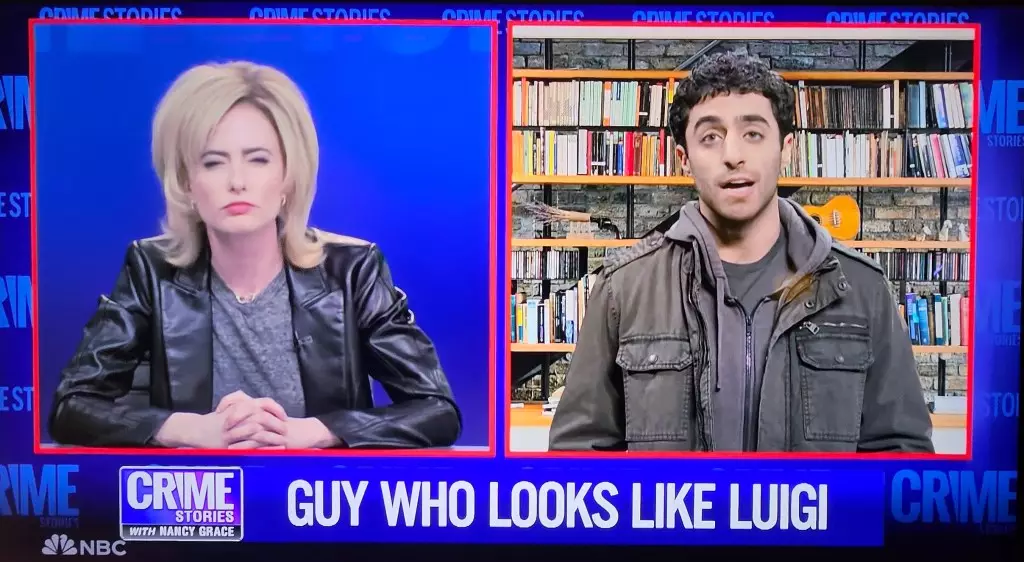In the realm of late-night television, Saturday Night Live (SNL) has managed to carve out a unique niche for itself as a platform that not only entertains but also engages with contemporary cultural and political issues. A recent episode, featuring Nancy Grace’s spirited portrayal, demonstrates this dedication to merging satire with real-world events, albeit with mixed results. Examining the blend of humor and commentary can reveal much about the evolution of comedy and its reception in today’s society.
This SNL episode took aim at the sensationalism surrounding current events, particularly focusing on the bizarre fascination that some have for public figures accused of heinous crimes. The character of Luigi Mangione, dubbed the “healthcare assassin,” serves as a vehicle for exploring a darker side of pop culture that glorifies criminals. Sarah Sherman’s impersonation of Nancy Grace captures the host’s characteristic outrage while simultaneously critiquing the absurdity of how society often romanticizes those who engage in violence.
By portraying Mangione in this light, SNL effectively highlights the juxtaposition between the seriousness of crime and society’s inclination to celebrate certain “bad boys.” This part of the skit resonates strongly, as it reflects contemporary concerns over the blurred lines between notoriety and celebrity. Sherman’s commentary that folks online celebrated Mangione’s “hard work” is not mere jest; it raises the question of how roadblocks between morality and media perception have eroded over time.
Outrageous Satire or Failed Attempt?
While the initial premise seemed promising, the execution faltered in moments. Although Sherman’s portrayal was commendable, the overreliance on predictable punchlines showcased a significant weakness. The skit devolved into crude humor that, rather than exploring the complexity of public fascination with criminals, relied on superficial jokes about Mangione’s looks and perceived allure. This turned what could have been a nuanced commentary into an uninspired barrage of clichés, proving that even talented performers can fall into the traps of conventional comedy.
Moreover, the attempt to encapsulate modern media’s noisy landscape—paralleled through abrupt ad interruptions—came off as a gimmick rather than an insightful critique. SNL, usually a trailblazer in content, resorted to tired tropes that reflect an uneasy familiarity rather than a fresh perspective.
A Reflection on Hosts and Guest Stars
The choice of Chris Rock as the host offered another layer of significance. An established comedian with a vast background of social commentary, Rock’s presence hinted at the potential for a deeper comedic exploration. However, the disappointing reception of the cold open raises questions about the balance between the host’s style and the creative direction of the skits. With Rock at the helm, viewers anticipated not just laughter but a challenge to reflect critically on the absurdities of contemporary culture.
While incorporating past cast members and alternating between various comedic styles can generate nostalgia, it also risks overshadowing the current cast’s ability to innovate. Instead of diverse voices and fresh angles, audiences might receive rehashed material, leading to diminishing returns in terms of audience engagement and critical acclaim.
As SNL approaches its 50th anniversary, it must navigate an evolving comedic landscape that is markedly different from when it first aired in 1975. The show’s legacy as a bastion of satire is under constant threat from social media and other content avenues that offer immediate gratification and commentary. To retain relevance, SNL needs to strategize how to merge its traditional formats with bold new storytelling techniques while staying attuned to the multifaceted nature of humor in contemporary society.
While the recent episode of SNL made commendable attempts to tackle serious issues wrapped in humor, it ultimately fell short of delivering impactful satire. As the show continues on its pivotal journey, it must embrace innovation while retaining the core values that allowed it to thrive for decades. Only then can SNL truly uphold its legacy as a leading force in American comedy.


Leave a Reply